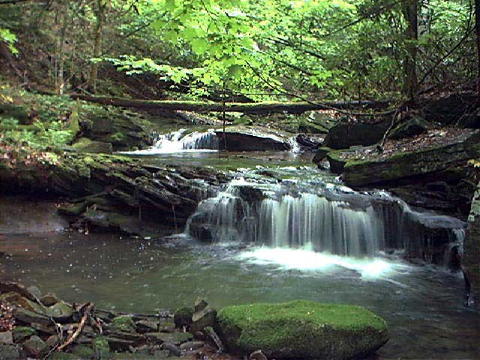
West Virginia's most precious mountain and river areas, nearly one million acres, are being threatened unless you want it stopped. The Monongahela National Forest surrounds or is part of Dolly Sods Wilderness, Seneca Rocks, Spruce Knob, Cranberry Wilderness, Otter Creek, Seneca Creek, Shavers Fork, the Blackwater, Cheat, Williams, Greenbrier, Elk, Tygert, Cherry and Gauley Rivers ...
Photo from USDA Forest Service
By Bob Weaver
"Everybody needs beauty as well as bread, places to play in and pray in, where nature may heal and give strength to body and soul." - John Muir
ALSO READ "SUNNY CAL JOURNAL - The Great Power Has Gifted"
The Monongahela National Forest, West Virginia's great natural treasure, is on the block for logging, mining, drilling, pesticide application and road building under the Bush administration's Healthy Forest Imitative, a plan that defines the changes as "habitat restoration."
The question is, will West Virginia's outdoorsmen and families who have long used and revered the Mon's precious mountains, waters, wildlife and wilderness areas, stand up against the Bush administrations efforts toward extraction?
The administration claims such changes will be good for the forest.
The West Virginia Wilderness Coalition says this beautiful forest, including Cranberry Backcountry, Tea Creek Mountain and Seneca Creek Backcountry, are at risk.
The Mon's land management plan is now being reviewed, and new changes will decide what use will be permitted by the U. S. Forest Service for years to come.
The "Healthy Forest" policy, widely supported in Congress, are considered corporate giveaways of public lands by most of the nation's conservationists.
They believe the current administration is violating America's most precious woodlands, mountains, streams, wilderness and scenic areas.
The "Healthy Forest" act also handcuffs conservation groups and citizen activists. The Forest Service
plans to release a draft of the Mon plan by late spring, meaning that
important decisions are quietly being shaped behind the scenes.
It will cut straight to drastic changes, utilization agreements and contracts.
The government putting public interest in the back seat is nothing new, from dipping into public lands to tax breaks.
The West Virginia Legislature gave millions of dollars in tax breaks to large timber corporations with the Managed Timberlands Bill.
Legislators told citizens the bill would help landowners improve their woodlots, which it did, but in fact the bill gave a 66% tax break to large corporations that were already managing their timber. It also pulled hundreds of thousands of dollars from county tax bases.
The Bush administration used the fear of raging forest fires to get support for their "Healthy Forest" initiative. "They're working on public fear that a big, catastrophic fire is going to come eat my home," said Deb Robison, a Sierra Club organizer in Boulder, Colo. "The problem is, this ("Healthy Forests") won't really protect people's homes."
The Bush plan is opening up 20 million acres of the nations protected forests to extraction, telling the public it is good management. In fact most Americans, hikers, outdoorsmen, campers, hunters and fishermen are opposed to it, but many of them will not speak out.
"The Forest Service has been quietly weighing its options for the Mon's future for decades to come," according to the Coalition, which represents the West Virginia Highlands Conservancy, the WV Chapter of the Sierra Club
and The Wilderness Society.
Most West Virginians from the time they were small children have visited and spent time in the "Mountains of the Mon." It is an oasis of natural forests and clean drinking water. Local businesses and communities will benefit more from protecting its
natural heritage and recreational opportunities than
from
increased extraction.
Cranberry Backcountry, Tea Creek
Mountain, and Seneca Creek Backcountry are special places called "6.2 Areas"
by the Forest Service. These areas are among some of the forest's most
special places and they are currently off-limits to logging, extraction and road
construction.
My family spent several years along Cranberry River and hiking in Cranberry Backcountry, which supports some of the best fishing, hunting and camping opportunities in the state.
Logging, road building and other extraction is now called "restoration" in the Bush bill, allowing resultant damage to streams and sensitive wildlife.
Without a public outcry, the sacred "6.2 places" will no longer exist in West Virginia.
Meanwhile, The West Virginia Wilderness Coalition has identified 15 special places in the Monongahela
Forest that deserve permanent protection as congressionally designated Wilderness Areas.
If you have concerns for the future of the Mon Forest plan revision, now is the time to write your personal comments to Clyde Thompson:
cnthompson@fs.fed.us
| 


